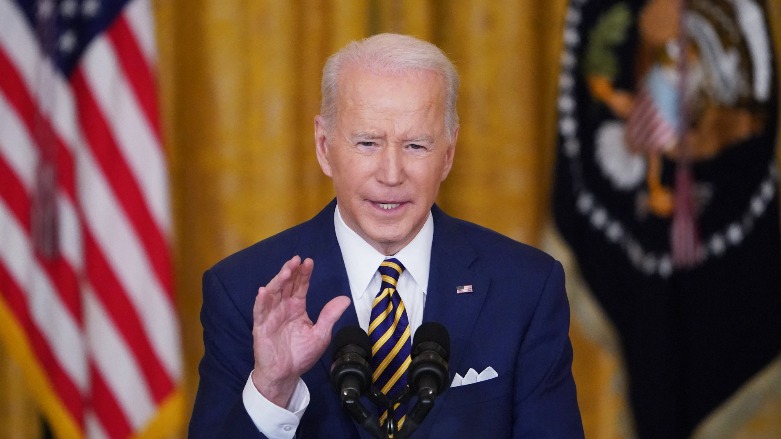Biden: Russian invasion of Ukraine' distinctly possible,' even as he reaffirms US preference for diplomacy

WASHINGTON DC (Kurdistan 24) – On Tuesday afternoon, US President Joe Biden addressed the American public about the crisis in Ukraine for the first time.
Despite renewed optimism about prospects for a negotiated resolution of the crisis, Biden warned that a Russian attack on Ukraine "is still very much a possibility."
Russian President Vladimir Putin had said earlier on Tuesday that Moscow was conducting a "partial withdrawal" of its forces on the Ukrainian border, but Biden cautioned, "We have not yet verified that."
Continued Russian Build-Up?
Indeed, NATO Secretary-General Jens Stoltenberg responded even more strongly to Putin's claim. While he said there were grounds for "cautious optimism," he tempered that with the remark, "So far, we have not seen any de-escalation on the ground from the Russian side. Over the last weeks and days, we've seen the opposite."
Late on Tuesday, ABC News reported in a similar vein. There was no withdrawal, it said. Rather, "Russian troops are instead moving forward closer to the line, including with medical supplies, and being put into firing positions."
The Russian "military continues to undertake activities that appear not only to ready an offensive but to thwart any attempt by the United States and NATO to intervene," The Washington Post similarly reported late the same day.
The Russian actions that would deter western intervention, the Post explained, include "the prospect of a large-scale nuclear exercise, the presence of sophisticated air defenses in Belarus and elsewhere, and an array of powerful naval assets spread throughout the Black and Mediterranean seas."
Those movements underline "just how difficult and dangerous any attempted intervention" to stop a Russian attack on Ukraine would be, it said.
Biden's Warning to Putin
Washington will not send troops to defend Ukraine, as Biden has made clear. Ukrainians must do that themselves, but the US is supplying arms to enable them to do so.
"While I will not send American servicemen to fight Russia in Ukraine," Biden said, "we have supplied the Ukrainian military with equipment to help them defend themselves. We have provided training and advice and intelligence for the same purpose."
Biden also warned Putin that he was committed to defending all members of NATO.
"Make no mistake," Biden said. "The United States will defend every inch of NATO territory with the full force of American power. An attack against one NATO country is an attack against all of us."
The US commitment to that principle "is sacrosanct," Biden affirmed.
But if Biden's warnings were ignored, and Putin really did invade Ukraine again, "the United States and our Allies and partners around the world are ready to impose powerful sanctions," along with export controls, the US president affirmed.
US Prefers Diplomacy
As it has been made clear from the beginning of the crisis, the Biden administration prefers negotiations.
On Monday, in advance of Tuesday's visit of German Chancellor Olaf Scholz to Moscow, Russian officials had signaled, somewhat abruptly, that they did want to engage in diplomatic negotiations, and they were drawing down some of their troops.
Thus, as Biden stated in Tuesday's televised address, "Yesterday the Russian the government publicly proposed to continue the diplomacy. I agree." Biden then cited a series of issues that might be discussed: "new arms control measures, new transparency measures, new strategic stability measures."
However, as Ben Rhodes, Deputy National Security Adviser in the Obama administration, noted, "Biden did not seem optimistic about the latest Russian overtures."
Rhodes noted that Biden appeared to be preparing the US public for what could come next—including rising energy prices. Russia is a major exporter of oil and natural gas, and cutting off the import of Russian energy in order to impose tough-minded sanctions would likely have a significant impact on prices.
"So we are taking active steps to alleviate the pressure on our own energy markets," Biden explained.
Biden sees high stakes at play in the crisis. "This is about more than just Russia and Ukraine," he said. "It's about standing for what we believe in, for the future we want for our world, for liberty," he continued, and "the right of people to determine their own futures, for the principle that a country can't change its neighbor's borders by force."
